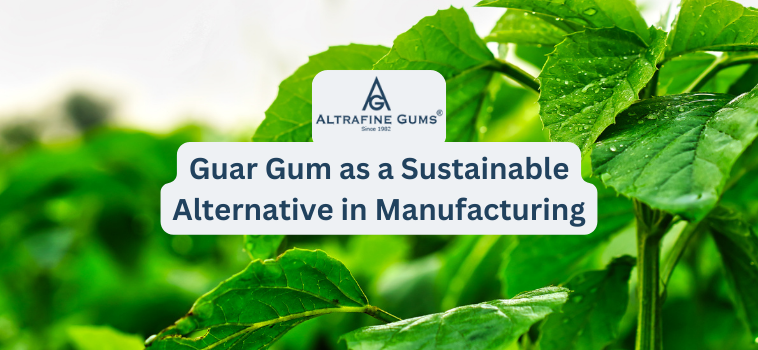In the quest for sustainable and eco-friendly manufacturing practices, guar gum has emerged as a game-changer. Derived from the seeds of the guar plant (Cyamopsis tetragonoloba), this natural polymer is not only biodegradable but also versatile, making it a valuable resource across numerous industries.
From its environmental benefits to its applications and role in the circular economy, guar gum is proving to be an essential component in transforming traditional manufacturing processes.
Biodegradable Benefits of Guar Gum
One of the most compelling reasons for the adoption of guar gum in manufacturing is its biodegradability. Unlike synthetic, non-biodegradable materials that persist in the environment for decades, guar gum naturally decomposes, leaving no toxic residues behind.
1. Reducing Plastic Dependency
Guar gum can replace synthetic thickeners, stabilizers, and binding agents in various industries, reducing reliance on plastic derivatives. For instance, guar gum’s thickening properties make it an ideal substitute for synthetic polymers in food, cosmetics, and paper production, thereby curbing environmental pollution.
2. Enhancing Soil and Water Health
The production and disposal of guar gum have minimal impact on ecosystems. Its biodegradable nature ensures that it breaks down into organic matter, enriching the soil and reducing water contamination compared to synthetic alternatives.
3. Low Carbon Footprint
The cultivation of guar plants itself contributes to environmental sustainability. Guar crops require minimal water, grow well in semi-arid regions, and help prevent soil erosion, aligning with the goals of sustainable agriculture.

Applications Across Industries
Guar gum’s unique properties have led to its widespread use in various industries that are adopting eco-friendly practices. Let’s explore how this sustainable ingredient is driving innovation:
1. Paper Strengthening
In the paper industry, guar gum is used as a natural additive to enhance the strength and texture of paper products. Its use eliminates the need for synthetic binders, making the paper production process more environmentally friendly. This is particularly important in producing high-quality recycled paper, where guar gum improves the binding of fibers.
2. Textile Printing
Guar gum plays a critical role in the textile industry, particularly in textile printing and dyeing. It acts as a thickening agent, ensuring smooth and uniform application of dyes without the use of chemical-based thickeners. This leads to less chemical waste and promotes sustainable practices in textile manufacturing.
3. Food Industry
Though not directly related to manufacturing, the food industry heavily relies on guar gum as a stabilizer and emulsifier in products like ice cream, sauces, and gluten-free baked goods. Its natural and biodegradable nature makes it a healthier and more sustainable option than synthetic additives.
4. Cosmetics and Personal Care
Guar gum is a popular ingredient in shampoos, conditioners, lotions, and creams due to its ability to provide viscosity and stability. Its natural origin aligns with the increasing demand for organic and eco-friendly personal care products.
5. Oil and Gas
While the oil and gas industry might seem counterintuitive in a discussion about sustainability, guar gum is used in hydraulic fracturing (fracking) fluids to enhance efficiency, thereby reducing the overall resource consumption in these operations.
Guar Gum and the Circular Economy
Promoting Renewable Resources
Guar gum is derived from guar beans, a renewable resource. Its production aligns with the principles of the circular economy, which emphasizes the continuous use of resources and minimal waste generation. The farming of guar plants supports sustainable agriculture, as the crop can be regrown and harvested multiple times with low environmental impact.
Enhancing Recyclability
In industries like paper and textiles, guar gum facilitates recycling by improving the strength and quality of recycled materials. For example, in recycled paper production, guar gum acts as a natural binder, ensuring that the final product meets quality standards without additional synthetic inputs.
Closing the Loop
Guar gum enables the development of manufacturing systems where resources are reused and regenerated. Its biodegradable nature ensures that any waste generated during production or use re-enters the ecosystem as organic matter, completing the life cycle without harming the environment.
Supporting Sustainable Manufacturing Goals
The use of guar gum allows companies to meet sustainability benchmarks, such as reducing their carbon footprint and minimizing their reliance on synthetic materials. By incorporating guar gum into their processes, businesses can align with global efforts toward greener manufacturing practices.
Why Choose Guar Gum?
1. Cost-Effective Solution
Guar gum is not only sustainable but also cost-effective. Its availability and versatility make it an economically viable alternative to synthetic materials, helping manufacturers save costs while reducing their environmental impact.
2. Versatility across Applications
Few natural ingredients offer the wide range of applications that guar gum does. Whether it’s improving the strength of paper, stabilizing food products, or enhancing textile printing, guar gum is adaptable to various industries.
3. Meeting Consumer Demand
Today’s consumers are increasingly eco-conscious, favoring brands and products that prioritize sustainability. By integrating guar gum into their processes, manufacturers can appeal to this growing demographic and build brand loyalty.
Altrafine Gums
When it comes to sourcing high-quality guar gum, look no further than Altrafine Gums, a trusted leader in the guar gum industry. With a commitment to sustainability and innovation, Altrafine Gums provides top-notch guar gum products tailored for various industrial applications. By choosing Altrafine Gums, you are not only ensuring superior quality but also contributing to a greener planet.
Conclusion
As industries increasingly prioritize sustainability, guar gum stands out as a remarkable alternative to synthetic materials. Its biodegradability, versatility, and role in promoting a circular economy make it indispensable in modern manufacturing. Whether it’s strengthening paper, enhancing textile printing, or stabilizing food products, guar gum is leading the charge toward a sustainable future.
Partner with Altrafine Gums to integrate this eco-friendly solution into your processes and join the global movement for greener manufacturing practices. With guar gum at the forefront, the possibilities for sustainable innovation are endless.
FAQ: Guar Gum in Sustainable Manufacturing
Q1. What is guar gum, and why is it considered sustainable?
A: Guar gum is a natural polymer derived from the seeds of the guar plant. It is biodegradable, renewable, and reduces reliance on synthetic, non-biodegradable materials, making it a sustainable choice for manufacturing.
Q2. How does guar gum replace synthetic materials in manufacturing?
A: Guar gum acts as a thickener, stabilizer, and binding agent, replacing synthetic polymers and chemical-based additives in industries such as paper, textiles, and food production.
Q3. What are some specific applications of guar gum in manufacturing?
A: Guar gum is used in paper strengthening, textile printing, dyeing processes, food stabilization, cosmetics, and even in the oil and gas industry for efficient operations.
Q4. Can guar gum contribute to a circular economy?
A: Yes, guar gum promotes a circular economy by being renewable, biodegradable, and facilitating recycling in industries like paper and textiles. It also supports sustainable agricultural practices.
Q5. Is guar gum cost-effective compared to synthetic alternatives?
A: Absolutely. Guar gum is not only environmentally friendly but also a cost-effective solution due to its availability and versatility across various industries.
Q6. How does guar gum enhance the recyclability of products?
A: In applications like paper production, guar gum improves the binding of fibers in recycled materials, ensuring high-quality end products without synthetic inputs.
Q7. Why is guar gum important for eco-friendly manufacturing?
A: Guar gum reduces the reliance on synthetic materials, supports biodegradable processes, and aligns with sustainable production goals, making it crucial for environmentally conscious manufacturing practices.


